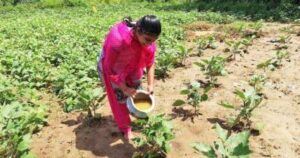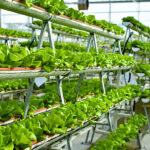India, with its rich agricultural heritage, is poised to lead the way towards a sustainable farming future. By embracing innovative practices, prioritizing ecological balance, and empowering farmers, India can ensure food security, environmental stewardship, and the well-being of its rural communities.
- Regenerative Agriculture: Regenerative agriculture holds the key to sustainable farming in India. By focusing on soil health, biodiversity, and ecosystem restoration, this approach promotes the long-term sustainability of farming systems. Practices such as cover cropping, crop rotation, and organic fertilization help enhance soil fertility, improve water retention, and reduce the need for synthetic inputs. Implementing regenerative agriculture on a larger scale can mitigate climate change impacts, restore degraded land, and create resilient farming communities.
- Precision Farming Technologies: The adoption of precision farming technologies can revolutionize Indian agriculture. Leveraging tools like remote sensing, GPS, and data analytics enables farmers to optimize resource utilization, reduce waste, and increase productivity. Smart irrigation systems, for example, conserve water by delivering it directly to the roots of plants based on real-time moisture data. Precision farming also facilitates precision application of fertilizers and pesticides, minimizing environmental pollution and improving crop health. By embracing these technologies, India can achieve sustainable intensification, enhance farmer livelihoods, and reduce the ecological footprint of agriculture.
- Agroforestry and Permaculture: Promoting agroforestry and permaculture practices is essential for a sustainable farming future in India. Integrating trees, shrubs, and crops on farms not only diversifies production but also improves soil fertility, sequesters carbon, and provides ecosystem services. Agroforestry systems can offer shade, fodder, and additional sources of income while restoring biodiversity and reducing soil erosion. Permaculture principles, such as designing for resilience and maximizing resource efficiency, guide sustainable farming systems that mimic natural ecosystems. By encouraging these approaches, India can create sustainable landscapes, protect fragile ecosystems, and secure the livelihoods of rural communities.
- Farmer Empowerment and Education: Empowering farmers through education and capacity-building is critical for sustainable agriculture in India. Providing access to training, information, and resources equips farmers with the knowledge and skills needed to adopt sustainable practices. Government initiatives, NGOs, and private sector collaborations can play a vital role in delivering farmer-centric programs that promote sustainable agriculture. By fostering knowledge sharing, promoting financial inclusion, and supporting farmer cooperatives, India can enable farmers to embrace sustainable practices, improve their incomes, and build resilient farming communities.
- Market Demand for Sustainable Produce: Creating market demand for sustainable produce is crucial for driving change in Indian agriculture. Consumers increasingly value sustainable and organic products, creating opportunities for farmers who adopt environmentally friendly practices. By incentivizing sustainable farming through fair trade policies, certification programs, and consumer awareness campaigns, India can create a market ecosystem that rewards sustainable producers. Connecting sustainable farmers with urban markets, restaurants, and e-commerce platforms can ensure that farmers receive fair prices and consumers have access to safe, nutritious, and ethically produced food.
India’s sustainable farming future lies in the integration of regenerative agriculture, precision farming technologies, agroforestry, farmer empowerment, and market demand for sustainable produce. By embracing these approaches, India can achieve food security, protect the environment, and empower its farmers to build thriving and resilient agricultural systems.




